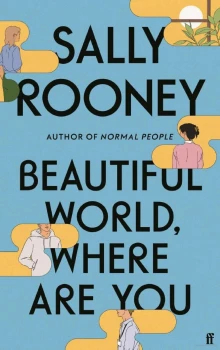Alice, do you think the problem of the contemporary novel is simply the problem of contemporary life? I agree it seems vulgar, decadent, even epistemically violent, to invest energy in the trivialities of sex and friendship when human civilisation is facing collapse. But at the same time, that is what I do every day. We can wait, if you like, to ascend to some higher plane of being, at which point we’ll start directing all our mental and material resources toward existential questions and thinking nothing of our own families, friends, lovers, and so on. But we’ll be waiting, in my opinion, a long time, and in fact we’ll die first. After all, when people are lying on their deathbeds, don’t they always start talking about their spouses and children? And isn’t death just the apocalypse in the first person? So in that sense, there is nothing bigger than what you so derisively call ‘breaking up or staying together’ (!), because at the end of our lives, when there’s nothing left in front of us, it’s still the only thing we want to talk about. Maybe we’re just born to love and worry about the people we know, and to go on loving and worrying even when there are more important things we should be doing. And if that means the human species is going to die out, isn’t it in a way a nice reason to die out, the nicest reason you can imagine? Because when we should have been reorganising the distribution of the world’s resources and transitioning collectively to a sustainable economic model, we were worrying about sex and friendship instead. Because we loved each other too much and found each other too interesting. And I love that about humanity, and in fact it’s the very reason I root for us to survive – because we are so stupid about each other.
As to this last point, I speak from personal experience. On the way home from a birthday thing last night, I kind of randomly got off the bus at Grove Park and walked over to Simon’s house. I suppose I was a little bit drunk and feeling bad about myself, and maybe I thought I could rely on him to rub my shoulders and give me compliments. Or maybe I wanted him not to be there. Or to be there with this girl he’s been seeing, so I could feel even worse about myself. I don’t know. I don’t know what I wanted, or what I thought would happen. Anyway, when I got upstairs it was obvious the buzzer had woken him up, and he’d had to get out of bed to let me in. It wasn’t really late, only around midnight. He was standing in the doorway looking tired and old. I don’t mean that in a bad way. But when I see him usually, I suppose I’m used to seeing the same beautiful blonde teenager I’ve always seen, since I was a little girl. And when he was standing in the doorway last night I realised, he’s not that boy anymore. What do I really know about his life? When I developed my first teenage crush on Simon, I didn’t understand sexual feelings very well, and I came up with the phrase ‘the special touch’ to describe to myself how I felt when he touched me. Which, by the way, he only ever did either by accident or in the most chaste ways imaginable. Isn’t that a really funny phrase, ‘the special touch’? Thinking about it now, it makes me want to laugh. But then last night in bed, he put his arms around me and immediately those words rushed back into my mind, like the last fifteen years were nothing, and the feeling was the same.
We ended up going to Mass together this morning. The church on his street has a very glamorous stone portico at the entrance and the extraordinarily Catholic name ‘Church of Mary Immaculate, Refuge of Sinners’. He didn’t ask me to come with him, by the way, I wanted to go, though I’m not sure now why I wanted to. It’s possible I was getting such a nice feeling from his company that I just didn’t want to be physically parted from him for an hour. But it’s also possible, and I’m not sure how to put this, that I didn’t want him to go without me because I felt jealous. Now that I’ve said it, I don’t really know what I mean by that. Do I resent him for liking the concept of God better than he likes me? The idea seems plainly absurd. But then what? Having put myself back on intimate terms with Simon, albeit for a brief interlude, was I afraid that he was going to Mass to cleanse himself of me? Or maybe in a way I didn’t really believe he was going to go through with it, and that if I offered to go with him, he would have to come out and admit he had not been totally serious about the religion thing after all. In the end of course we filed into the church together uneventfully. Inside, it was all white and blue, with painted statues, and dark panelled confession boxes with luxurious velvet curtains. Most of the other attendees were little elderly women wearing pastel-coloured jackets. When the service began, Simon didn’t suddenly start acting very intense and spiritual, or crying about the majesty of God the Father or anything like that, he was just his usual self. Mostly he sat there listening and doing nothing. At the beginning, when everyone kept repeating ‘Christ have mercy’ and all of that, I think a part of me wanted him to start laughing and tell me it was all a joke. In a way I felt afraid of the way he was behaving, saying things like ‘I have greatly sinned’ – actually saying such things out loud in his ordinary voice, the same way I might say ‘it’s raining’, if I had a sincere belief that it was raining and nothing about this belief struck me as ridiculous. I looked over at him a lot, feeling I suppose alarmed by his seriousness, and he just glanced back at me in a friendly way, as if to say: Yes, this is Mass, what did you expect? Then there was a reading about a woman pouring oil on the feet of Jesus and, I think, drying his feet with her hair? Unless I misunderstood. Simon sat there listening to this patently bizarre and freakish story and looking, as ever, completely calm and ordinary. I know I keep saying how ordinary he was, but it was precisely the seeming absence of any change in his personhood, precisely the fact that he went on being fully and recognisably the same man as always, that was so mystifying to me.
After the readings, the priest started blessing the bread and wine, and then he asked the congregation to lift up their hearts. All at the same time, in a soft collective whisper, everyone in the church replied: ‘We lift them up to the Lord.’ Is it really possible I witnessed such a scene, right in the middle of Dublin, only a few hours ago? Is it possible such things literally go on, in the real world you and I both live in? The priest said ‘Lift up your hearts’, and everyone, including Simon, replied without any hesitation or irony: ‘We lift them up to the Lord.’ Did they believe they were telling the truth, and that their hearts in that moment really were lifted up to the Lord, whatever that even means? If I’d asked myself that question yesterday, I would have said, of course not. Mass is just a social ritual, religious people don’t actually spend time thinking about God, and they certainly never try to lift their hearts up toward him or to conceptualise what it would mean to do such a thing. But today I feel differently. I feel that at least some of the people in that church sincerely believed that they were lifting their hearts up to the Lord. And I think Simon believed it. I think he knew what he was saying, and had thought about it, and believed it was true. After that, the priest asked us to give each other the sign of peace, and Simon shook hands with all the silvery little elderly women, and then he shook my hand and said ‘Peace be with you’, and by then I wanted him to mean it. I didn’t feel anymore that I wanted him to be joking, and in fact I felt that I wanted him to be as serious as he seemed, and more serious, and to mean every word.
Can it be that during the service I actually came to admire the sincerity of Simon’s faith? But how is it possible for me to admire someone for believing something I don’t believe, and don’t want to believe, and which I think is manifestly incorrect and absurd? If Simon started to worship a turtle as the son of God, for example, would I admire his sincerity? From a strictly rationalist perspective, it makes as much sense to worship a turtle as it does to worship a first-century Judaean preacher. Considering that God doesn’t exist, the whole thing is random anyway, and it may as well be Jesus, or a plastic bucket, or William Shakespeare, it doesn’t matter. And yet I feel I couldn’t admire Simon’s sincerity if he went down the road of turtle worship. Am I just admiring the ritual, then? Admiring his ability to blandly and uncritically accept received wisdom? Or do I secretly believe there is something special about Jesus, and that to worship him as God, while not quite reasonable, is somehow permissible? I don’t know. Maybe it was just the calm, gentle way that Simon conducted himself in the church, the way he recited the prayers so quietly and sedately, just the same as the little old ladies did, and not trying to be any different from them, not trying to show that he believed any more or less ardently than they did, or any more critically or intellectually than they did, but just the same. And he didn’t even seem embarrassed that I was there watching him – I mean he wasn’t embarrassed for me, at how out of place I was, but he also wasn’t embarrassed for himself, to be caught in the act of worshipping a supreme being I didn’t believe in.
Afterwards on the street, he thanked me for coming with him. For a second then I was afraid he would make a joke of it after all, just out of awkwardness or nerves, and the idea horrified me. But he didn’t. I should have known he wouldn’t, because it wouldn’t have been like him. He just thanked me and we went our separate ways. If I say the Mass was strangely romantic I hope you’ll know what I mean. Maybe it made me feel there was something deep and serious in Simon, which I hadn’t seen for a long time, or maybe it was his gentleness when we were shaking hands. Or, as I’m sure an evolutionary psychologist would suggest, maybe I’m just a frail little female, and after sleeping in a man’s bed I come over all weak and tender about him. I make no great claims for myself, it could well be true. And writing this email I do feel a little weak and tender about Simon, and even a little protective, who knows why. If I had gone straight home this morning instead of going with him to the church, I’m not sure I would feel the same way now – but at the same time, if we had just gone to Mass this morning and we hadn’t slept together last night, I don’t think I’d feel like this now either. It was the seemingly ill-suited combination of sleeping together and then going to Mass afterwards that I think has given me this feeling – the feeling of entering into his life, even just briefly, and seeing something about him that I had never seen before, and knowing him differently as a result.
Speaking of friendship and romance: how is Rome? How is Felix? How are you? The parts of your email about sexuality were very funny. Do you think you’re the only person who has ever felt sexual desire?? In case the answer is yes, I am attaching a PDF of Audre Lorde’s essay ‘Uses of the Erotic’, which I know for a fact you will greatly enjoy. Finally – yes of course you should invite Simon to stay! I know he wants to see you, and I can’t think of anything better in the world than having the two of you to myself for a week by the seaside. Love always, E.





